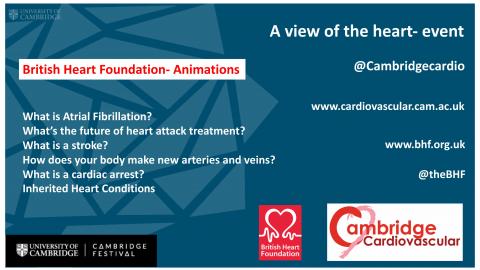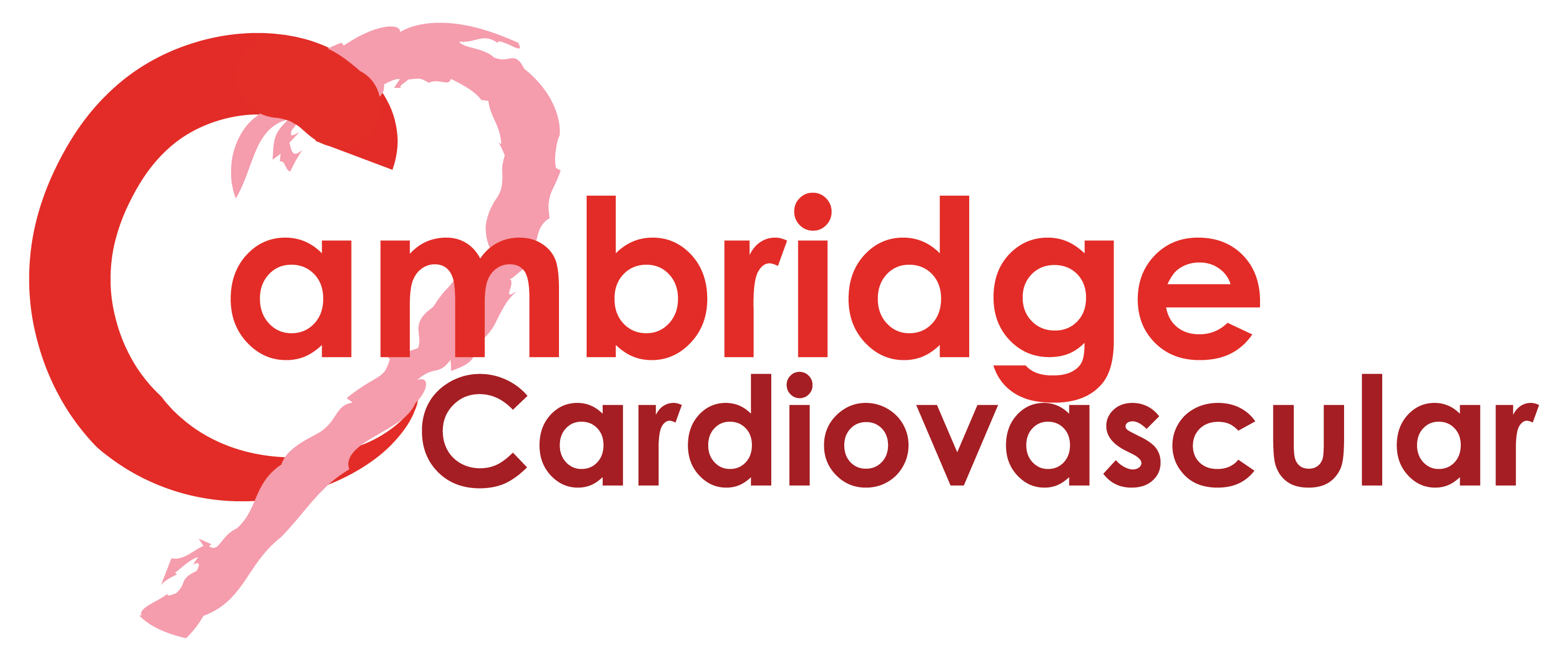The British Heart Foundation provides an interactive learning tool, Know Your Heart, and a range of information suitable for teens. They also have a wide variety of videos about cardiovascular disorders on YouTube and here BHF Research Animation
BHF - Research Animations

- What’s the future of heart attack treatment?
www.youtube.com/watch?v=_P1AIAZWs68
From better prediction to new treatments, find out how BHF-funded research is taking steps to reduce the heartbreak caused by heart attacks.
- Vascular dementia
www.youtube.com/watch?v=r7dSJR5Xzfo
Vascular dementia happens when there’s a problem with the blood supply to an area of your brain. In this animation we explain the symptoms, causes and treatment for the condition.
- A filter to make surgery safer
www.youtube.com/watch?v=zfFPffUuxPg
BHF-funded scientist Dr Gregory Quinlan and his team are working on a blood filter that could reduce the complications that can occur from open heart surgery. The filter could trap potentially harmful substances in the blood while it’s in the heart-lung machine, to make the blood safer when it’s returned to the patient.
- What is Atrial Fibrillation?
www.youtube.com/watch?v=ezTEc6GwLNs
Atrial Fibrillation affects your hearts ability to pump blood around your body. In this animation we explain why it’s important to get tested for AF, even if you have very mild symptoms.
- What is a stroke?
www.youtube.com/watch?v=AM-r6AcPsaw
A stroke is when the blood supply to part of your brain is cut off. In this animation we explain what a stroke is and the risk factors associated with having one.
- Check your pressure
www.youtube.com/watch?v=cH_BF3q8UrY
Did you know high blood pressure increases your risk of heart attack or stroke? Nearly 5 million people in the UK don’t know they have it. Get checked - it's quick, free and easy. It could save your life.
- What is my target heart rate?
www.youtube.com/watch?v=k60x24nN9CM
If you’re wondering how to get active safely, or you want to start exercising after being diagnosed with a heart condition, we’ve created this animation and an online tool to calculate your target heart rate.
- How does your body make new arteries and veins?
www.youtube.com/watch?v=rgyfzunqtIo
Your arteries and veins carry blood all around your body. But how does your body make new ones?
- How space scientists are helping damaged hearts
www.youtube.com/watch?v=SZ92jwoXe1k
Find out how BHF researchers and space scientists are working together to create a new kind of left ventricular assist device (LVAD) to help damaged hearts.
- What is a heart attack?
www.youtube.com/watch?v=bw_Vv2WRG-A
A heart attack happens when there is a sudden loss of blood flow to part of your heart muscle. It’s often believed a heart attack will cause you to collapse, but this is not always the case. The animation explains what a heart attack is, how it can be treated, and lifestyle changes that can reduce the risk of having another heart attack.
- What is angina?
www.youtube.com/watch?v=k5VjGgk7Wqc
Angina is a pain or discomfort often felt in your chest area. The most common cause of angina is coronary heart disease, where the arteries that supply blood to your heart become narrowed, restricting the blood supply to your heart muscle. The animation introduces the different types of angina, what to do in situations that may trigger angina, and lifestyle changes that can prevent the condition becoming more severe.
- Understanding your weight
www.youtube.com/watch?v=TMDldXoDLrQ
This animation explains why being overweight increases the risk of coronary heart disease, and provides tips for keeping to a healthy weight.
- How smoking affects your heart
www.youtube.com/watch?v=cuG9aVnZf-A
Smoking is one of the biggest factors that can put you at risk of getting heart and circulatory diseases. But it’s never too late to give up smoking. Even if you have been smoking for decades, you can improve your long-term health by quitting smoking. The animation explores how quickly the health benefits will start to show after you stop smoking.
- What is a defibrillator?
www.youtube.com/watch?v=8A0kljQU48U
This animation explains what a defibrillator is, and how to use a defibrillator on someone who is having a cardiac arrest.
- What is a cardiac arrest?
www.youtube.com/watch?v=7lMiXJH_bw4
This animation explains what a cardiac arrest is, including its causes and symptoms, and what to do if you witness someone having a cardiac arrest.
- What can a little fish tell us about repairing our hearts?
www.youtube.com/watch?v=cAa5xmSoiU4
Fish living in the rivers and caves of Northern Mexico are helping to shed more light on why humans can’t repair their hearts when they get damaged. Now BHF-funded research is hoping to change this to help people with heart failure.
- Why does AF increase your risk of stroke?
www.youtube.com/watch?v=SXCeECd2zgo
People with AF are four to five times more likely to have a stroke. Our animation explains why AF increases the risk of a blood clot forming inside the heart. This can then travel to the brain and lead to a stroke.
- Understanding Blood Clots
www.youtube.com/watch?v=3l1vC6QDG4k
Blood clots are a major cause of heart and circulatory diseases. Blood clotting is a vital function which your body relies upon to repair wounds. But it can also cause serious conditions like heart attacks and strokes, as this short video explains.
- How do beta blockers work?
www.youtube.com/watch?v=uiYJKvwVhEU
Beta blockers are a type of medication which block the release of the stress hormones adrenaline and noradrenaline in certain parts of the body.
- How does warfarin work?
www.youtube.com/watch?v=P-O0DfjILsM
Warfarin is a widely prescribed anticoagulant medication which reduces the risk of blood clots forming.
- How do novel oral anticoagulants (NOACs) work?
www.youtube.com/watch?v=L9GaJmm6Exo
Novel oral anticoagulants (NOACs) are a newer type of anticoagulant medicine that makes the blood take longer to clot.
- How does aspirin work?
www.youtube.com/watch?v=WOWLsHldqwM
Aspirin is a medication which can be prescribed to people with heart and circulatory disease to help prevent blood clots.
- How do ACE inhibitors work?
www.youtube.com/watch?v=xIlaQuRaZmk
ACE inhibitors are a type of medication commonly used to treat heart failure and high blood pressure and are often prescribed to people following a heart attack.
- What is heart failure?
www.youtube.com/watch?v=m4aC0-x4zWQ
This animation explains what heart failure is, including its causes and symptoms, and shows the impact that heart failure can have on a person’s life.
- What is ARVC?
www.youtube.com/watch?v=yonqMyVdeVE
This animation explains what arrhythmogenic right ventricular cardiomyopathy (ARVC) is, including its causes and symptoms, and shows the impact that ARVC can have on a person’s life.
- Inherited Heart Conditions
www.youtube.com/watch?v=wsLCILJQ18w
This animation explains what inherited heart conditions are, describes the process of genetic testing for patients and their families, and shows the impact that an inherited heart condition can have on a person’s life.
- What is a pacemaker?
www.youtube.com/watch?v=_fC8JQwm-UU
This animation explains what a pacemaker is, why you might need one, how it works, and any extra things you should know after you’ve had one fitted.
- What is an implantable cardioverter defibrillator (ICD)?
www.youtube.com/watch?v=WYmwQyX7UXQ
This animation explains what an implantable cardioverter defibrillator (ICD) is, why you might need one, how it works, and any extra things you should know after you’ve had one fitted.
- Dilated cardiomyopathy (DCM)
www.youtube.com/watch?v=Wi1Q3qrDhKA
This animation explains what dilated cardiomyopathy (DCM) is, including its causes and symptoms and how DCM affects your life.
- Hypertrophic cardiomyopathy (HCM)
www.youtube.com/watch?v=_wQTmaRCeDE
Hypertrophic cardiomyopathy (HCM) is a disease of the heart muscle which makes it harder for blood to be pumped around the body. In this animation we explain the symptoms, causes and treatments for the condition.
BHF - Heart Matters
The BHF produces a Heart Matters Magazine. Professor Martin Bennett has contributed an article about Blocked Arteries.




